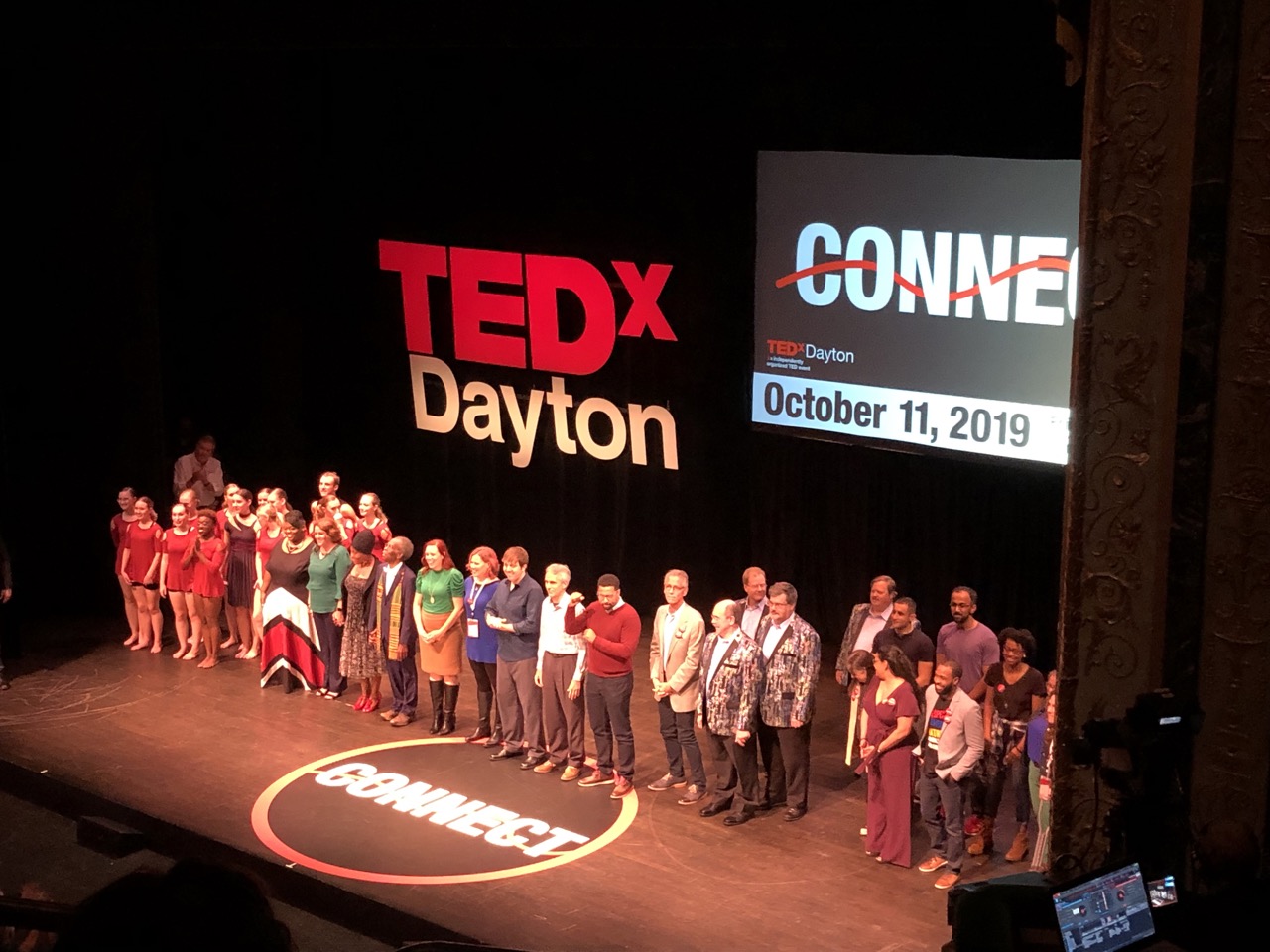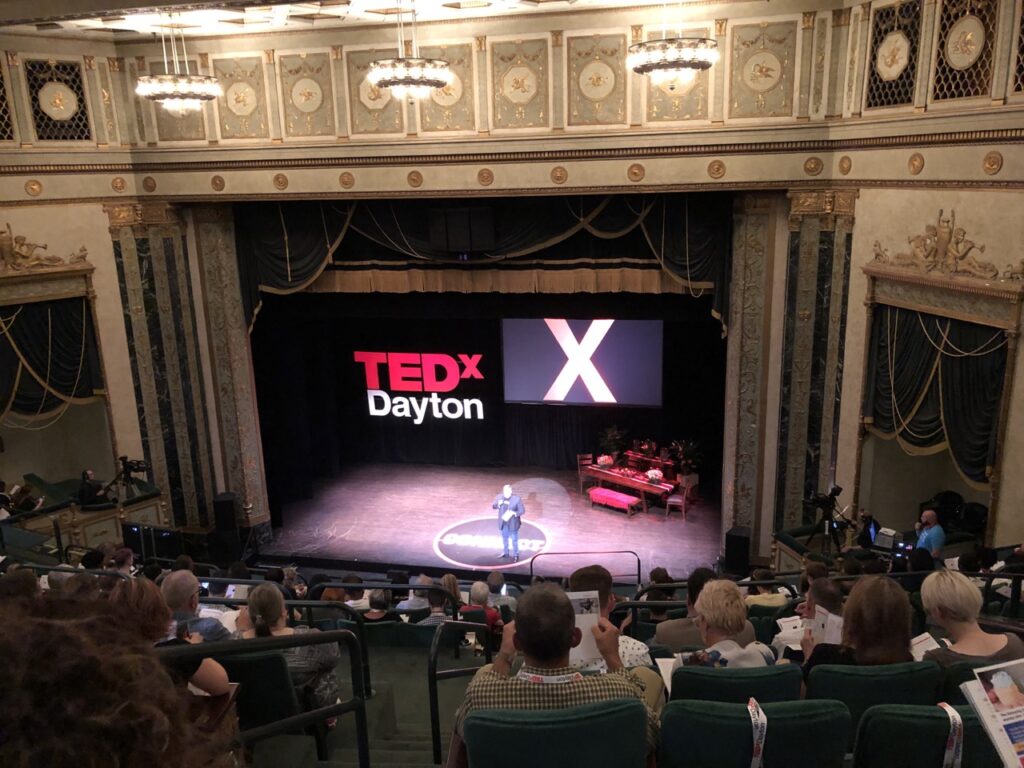
After seven years, TEDxDayton continues to bring thought-provoking talks to the Victoria Theatre with TEDxDayton 2019. This year, the motif was “Connect.” Connection was the concept that was woven throughout the presentations of the 21 speakers and performers as they shared their passions, thoughts, and ideas. Once again, these talks and performances gave the audience a lot to think about, especially these incredible quotes:
Reconnect with Math
Professor and robotics researcher, Luther Palmer, PhD, describes himself as a “math evangelist.” He urged everyone to reconnect with math and science, and urged current mathematician’s to reconnect math with subjectivity. Palmer explained that it’s easy for a mathematician to remove all context when working out a complex math problem, but in doing so, there’s a chance they’re missing a key component in removing the subject entirely. After all, the mathematicians who worked on the atomic bomb were successful in their calculations but at a devastating cost. He suggested that it’s time for mathematicians to connect their passions of math AND community to work on issues facing society, explaining that it’s important that they “stop doing math problems and start using math to solve problems.”
Keep Theatre Relevant
Daunielle Rasmussen has her work cut out for her as a theatre director in an age when young people don’t seem to have much of an interest in the performing arts. She explained that “my goal is to build a bridge to the younger generations.” It took four years of experimentation to figure out how to get younger people to attend live theatrical performances but in the end, Rasmussen learned that engaging audiences in interactive, immersive live performance experiences drew much bigger crowds across generations. She reached her conclusion by identifying what makes younger generations unique, focusing on maker culture and the understanding that entertainment has been interactive for them their entire lives.
Follow Your Interests
Poet and Professor Herbert Woodward Martin grew up in Alabama reading literature and poetry from black writers and poets, including Paul Laurence Dunbar. He later moved to Buffalo, New York, where his education had him reading primarily the works of white intellectuals. He eventually returned to Dunbar, studying his poetry and ultimately editing three volumes of Dunbar’s work. Martin particularly focused on Dunbar’s use of vernacular in his poetry, as it reflected how he spoke at home with family, as opposed to the white northern dialect he used with coworkers in Buffalo. After hearing him switch to a Southern dialect, a friend once asked Martin how and why he was essentially able to speak two languages. Martin replied, “Well, they pay me to talk this way in Buffalo.”
Maintain Financial Freedom
As a financial coach, Estelle Gibson helps her clients learn strategies to manage their money. With 66% of Americans being financially illiterate, her work is increasingly vital. This illiteracy places many people in a situation where a partner is in charge of household finances, leaving them with little choice if they should want to leave the relationship. “What feels like freedom is actually dependency,” said Gibson as she explained that financial abuse is more common than many realize and makes it difficult if not impossible for victims to have the resources to leave their abusers. She recommends making sure to have your account numbers and social security number on hand and use resources like the Allstate Foundation’s Purple Purse, which gathers donations to help victims of domestic violence get a fresh start away from their abusers.
Color in the Margins
Jennie Hempstead wants everyone to “draw the heart of the things you hear” rather than simply taking written notes. A creative content professional, she explained that drawing or using visuals can help aid in understanding a subject. Even doodling mindlessly can actually help our brains to listen more effectively. However, most people stop doodling when they are criticized. Most see it as a lack of artistic talent at best and a behavior discouraged by authority figures at worst. On the contrary, Hempstead illustrated that the human brain can process visuals around 60,000 times faster than text.
Watch Someone Cook
Modern kitchens are much more open than they once were. Miami University Architecture and Interior Design professor, Mary Rogero put the spotlight on the three women we have to thank for it. Margarete Schütte-Lihotzky was an Austrian architect who designed a kitchen in a box using the same methods for designing manufacturing facilities, placing the focus on function and ergonomics for the first time. Betty Crocker, while fictional, was heavily influential in making baking easier and its science more accessible for the everyday person. Last but not least, Julia Child invited us into her kitchen to watch as she prepared French recipes on her island, giving rise to generations of TV cooking shows. Each of these women invited us “to be in a kitchen that allows you to watch someone cook, to watch them dance through a simple meal, or sing and whistle,” said Rogero. “That’s the kind of kitchen I want to be in.”
Be a Math Person
Connie Vaughn is a self-proclaimed “math person” on a mission. “There’s no such thing as ‘not a math person’,” claims Vaughn. This belief is the cornerstone in her fight against innumeracy – a condition she described as illiteracy for math and numbers. She believes that as long as a person has a human brain and can speak a language, they are also a math person, as math and language are a package deal. She highlighted how cultural stereotypes play a large role in contributing to our self-perception in regard to mathematics. To combat this, Vaughn is an advocate of encouraging students to use a growth mindset – that they can learn and improve their mathematic skills in the same manner as any other subject.
Build to Last
Criswell Davis is an expert in hardwoods and believes they play and important role in preserving our environment. While trees absorb carbon from the air, they only do so for approximately 80 years, until they reach maturity and begin to leach it back into the atmosphere. “I encourage you to use hardwood in your built spaces,” Davis said. By taking advantage of selection harvest methods, we can be good stewards of American forests and do our part to help improve the health of the environment. Davis is also a proponent of biophilic design (a way of increasing our connection to nature by incorporating natural elements in interior designs). This method can aid in the treatment of illness or recovery, as humans naturally yearn to be in nature, especially when sick or hurt.
Sing It Out
Singer-songwriter Anna Baugham had to overcome a hefty fear of failure to add “songwriter” to her title. After being signed to a record deal, her label challenged her to write 90 songs in 90 days to help her become comfortable writing original material. But fear made it hard for Baugham to get used to the idea. Despite this, she gave songwriting a go and documented her progress each day on social media, posting snippets of each song. In the end she had several great songs for her album and considers herself in a healthy relationship with her mistakes. She said that it turns out that originally only playing other people’s songs “kept me in a cage I didn’t know I was in.”
Get Uncomfortable
“You are a racist. Yes, you are a racist.” This was the opening line of the talk by Training and Development Coordinator for the City of Columbus, Kenston Henderson Sr. After pausing a moment to let everyone uncomfortably shift their seats, he explained that feeling of discomfort was the goal. When you get people to feel uncomfortable, that’s when change happens. He suggested that rather than meeting racist sentiments from friends and colleagues in silent disagreement, we should engage them in conversation while following a specific set of rules. Henderson encouraged the audience to listen – with respect, empathy, and maturity. Only when people take the time to dismantle racist beliefs will real change occur.
Embrace Generalism
Brandy Foster proudly describes herself as a Generalist. She is someone who did not land in the professional field she studied for in college, and that is not a bad thing. Foster believes that as a society, “We need to rethink our bias toward specialists.” She used an old parlor game – The Imitation Game – to make her point. In the Imitation Game, the “interrogator” tries to discern which of the other two participants is the “pretender” and “the gold standard” by asking a series of questions. The pretender has a much higher chance of winning the game when he or she is a generalist rather than a specialist, as a generalist would have a wide swath of knowledge on any number of concepts. She explains that this approach is best for those in leadership roles, citing the importance of having a whole-field view.
Share Memes
Engineer Sid Thatham was busy earning his master’s degrees in chemical engineering and an MBA – sometimes too busy to go home to sleep in his own bed. On these nights, he took up residence under his desk. This was a tough time for the graduate student, as it would be for anyone, but he found solace in an unexpected place – in memes. He explained that memes are a great, visual vehicle for human connection. They help spread a little hope that comes from knowing a community feels similarly to you. He began sharing them with other grad students and developed a bit of a following among his peers. Needing to sleep was once a stressful experience, but because of sharing memes with his friends, he said “I looked forward to laughing myself to sleep.”
Cash In
“What is money?” Bitcoin advocate Jad Mubaslat asked upon taking the stage. We use money every single day and have never necessarily thought about what it really is. Mubaslat explained that money has to be durable, divisible, transferable, and scarce. Gold fulfills all of these criteria, but government-issued money is no longer backed by this standard and has increasingly become more and more susceptible to inflation. Mubaslat’s talk was part history lesson – Bitcoin came about as a response to the government bailouts due to the 2008 recession, but the identity of its creator remains a mystery to this day – and forecast: Bitcoin satisfies each of the previously stated criteria and could potentially be the main currency of the future.
Nurture Leadership
Crystal Phillips, PhD, was characterized as a menace by her teachers and school administrators and she could never figure out why. She supposed perhaps she enjoyed talking with her friends too much. She tried to ignore their attitudes toward her, but after winning the election for student body president and being refused her title because they considered her a discipline problem, it became her mission to change the system that doesn’t meet the needs of students. Phillips ultimately became a teacher and later a principal. Today, she makes sure her teachers lead their classrooms with a focus on nurturing and supporting leadership, and that they “build students up, not tear them down.”
Be Present
Donna Sanchez embarked on an unusual mission one January when she decided to spend a month in silence. A self-diagnosed “recovering over-talker,” Sanchez realized that in the past she had always used talking to fill the holes in conversation and avoid experiencing negative emotions. In meeting her new challenge, Sanchez found with silence she had no choice but to let negative emotions flood in, and that made her feel more human than ever before. She discovered that for her family and friends, a vow of silence means that “simply being present becomes more important.”
Keep Working
Dean Waggenspack is a career coach and wants to redefine how people view retirement. He explained that for a long time, retirement has been defined by The Greatest Generation, where work stops but people have financial stability to live without it. Waggenspack asks people entering their elderhood “What do you want to be when you grow up?” Today, elderly people can still work in many fields now that technology makes work possible from anywhere. Rather than think of retirement as a withdrawal from life, he explains that the Japanese word for retirement, ikigai, is defined as “the reason you get up in the morning.”
Check Your Bias
Data scientist Benjamin Holmes discussed how bias impacts our likelihood of being correct in any given scenario. He studies machine learning and artificial intelligence and noticed that when machines and people have a wide variety of sources to listen to, they would benefit from the wisdom of the crowd and answer questions correctly more frequently than when presented with a specific bias ahead of time. Holmes suggests that if you want to be correct, you need a variety of input from many sources, while admitting this can be difficult for humans in our divisive world. He explained that “our decision tree has become a forest of desires” and we are not listening enough to one another.
Express Yourself
Poet and spoken word artist A. Slate gave a memorable performance and talk about overcoming her struggles with mental health by embracing poetry. “Poetry is my voice,” she said, and she has used her love of the art form to create The WRITElife Village to help students learn to express themselves without judgement.
At TEDxDayton 2019, speakers from diverse backgrounds and walks of life gave the talk of their lives for the seventh year in a row, bestowing so many important ideas worth spreading to the people of Dayton. 2020 will bring even more. In addition to the signature event of TEDxDayton, TEDxYouth@Dayton will be held on March 5, and there will be three TEDxDaytonSalon events: Women, Defense, and After Dark.*

*TEDxDayton 2019 took place Friday, October 11 at the Victoria Theatre in Dayton, Ohio. At the time this was written, this was the planned series of upcoming events for TEDxDayton 2020, however the pandemic caused a postponement of these events. As of April 2024, there are no plans to host any Salon events.



